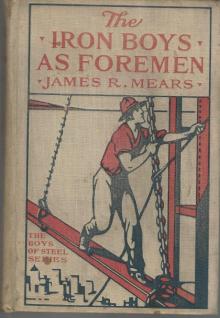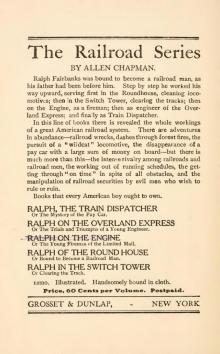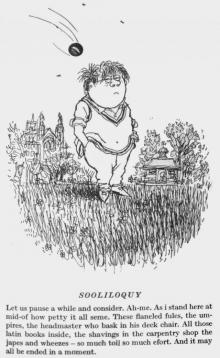- Home
- Mrs. Molesworth
Bert Wilson's Fadeaway Ball Page 4
Bert Wilson's Fadeaway Ball Read online
Page 4
CHAPTER IV
THE TRIPLE PLAY
The days flew rapidly by and the time drew near for the Spring trip. Allthe members of the team were to get a thorough trying out in actualgames with the crack teams of various colleges before the regularpennant race began. Then the "weeding out" process would have beencompleted, and only those remain on the team who had stood the testsatisfactorily. The trip was to take about two weeks, and they were to"swing around the circle" as far west as Cincinnati and as far south asWashington.
They did not expect much trouble in coming back with a clean score. Asone of the "Big Three," their team was rarely taken into camp by any ofthe smaller colleges. They usually won, occasionally tied, but veryseldom lost. Yet, once in a while, their "well-laid schemes" "wentagley" and they met with a surprise party from some husky team thatfaced them unafraid and refused to be cowed by their reputation.
Bert's college was one of the largest and most important in the country.The "Big Three" formed a triangular league by themselves alone. Eachplayed three games with each of the other two, and the winner of themajority was entitled to claim the championship of the "Big Three." Andit was generally, though not officially, admitted, that the team capableof such a feat was the greatest college baseball team in the wholecountry. Their games were followed by the papers with the greatestinterest and fully reported. The "Blues," as Bert's college was usuallyreferred to on account of the college colors, had won the pennant theyear before from the "Grays" and the "Maroons," their traditionalopponents, after a heart-breaking struggle, and columns of newspaperspace had been devoted to the concluding game. This year, however, theprediction had been freely made that history would not repeat itself.Both the Grays and Maroons were composed of tried and tested veterans,while, as we have seen, Ainslee had been compelled to fill severalimportant positions with new material. No matter how good this mightprove to be, it takes time and practice to weld it together in one smoothmachine, and it is seldom done in a single season.
Moreover, the time was at hand when Ainslee would have to rejoin his ownteam, and his keen eye still noted a number of rough places that neededplaning and polishing. For this reason he was all the more anxious tosecure good results during this trip. After it was over, he would haveto turn over the team to a manager and to Reddy, the assistant coach andtrainer. The manager would confine himself chiefly to the technical andfinancial features, but it was arranged that Reddy should have fullcharge of the team on the field. Ainslee reposed implicit confidence inhim because of his shrewd judgment, his knowledge of men, and his vastbaseball experience.
West Point was to be their first stop, and it was a jolly crowd, full ofthe joy and zest of living, that embarked on the steamer _HendrikHudson_, and sailed up the lordly river, the finest in the world, asmost of the boys agreed, though some, who had traveled, were inclined tofavor the claims of the Rhine to that distinction. They were disposed toenvy the Dutch explorer, who, first among civilized men, had sailed upthe river that bore his name and feasted his eyes upon its incomparablebeauty; a delight that contrasted so strongly with the final scene whenhe and his little son had been thrust by a mutinous crew into an openboat on storm-tossed Arctic waters, and left to perish miserably.The reward, as Dick cynically insisted, of most of the world's greatbenefactors, who have been stoned, burned, or otherwise slain by theirfellows, while posterity, too late, has crowned them with laurels andhonored them with monuments.
The game with Uncle Sam's cadets was a fight "for blood," as wasentirely appropriate for future soldiers. In the seventh, with thecadets one run behind, one of them attempted to steal from second tothird. Hinsdale got the ball down to Tom like a shot, but, in themix-up, it was hard to tell whether the runner had made the base or not.The umpire at first called it out, but the captain of the cadets kickedso vigorously that the umpire asked Tom directly whether he had touchedhim in time.
For an instant Tom hesitated, but only for an instant. Then hestraightened up and answered frankly:
"No, I didn't; he just beat me to it."
It is only just to Tom's companions to say that, after the first minuteof disappointment, they felt that he could and should have done nothingelse. The standard of college honor is high, and when it came to adirect issue, few, if any, of the boys would have acted differently.Even Reddy, with his free and easy views on winning games "by hook orcrook," as long as you win them, felt a heightened respect for Tom,although he shook his head dubiously when the man from third came homeon a sacrifice, tieing the score.
The tie still persisted in the ninth, and the game went into extrainnings. In the tenth the Blues scored a run and the cadets made agallant effort to do the same, or even "go them one better." A man wason second and another on third, when one of their huskiest batters cameto the plate. He caught the ball squarely "on the seam" and sent itstraight toward third, about two feet over Tom's head. He made atremendous jump, reached up his gloved hand and the ball stuck there.That of course put out the batter. The man on third, thinking it was asure hit, was racing to the plate. As Tom came down, he landed right onthe bag, thus putting out the runner, who had turned and was desperatelytrying to get back. In the meantime the man on second, who had taken abig lead, had neared third. As he turned to go back to second, Tomchased him and touched him just before he reached the bag. Three menwere out, the game was won, and Tom was generously cheered, even bythe enemy, while his comrades went wild. He had made a "triple playunassisted," the dream of every player and one of the rarest feats ever"pulled off" on the baseball diamond.
During the trip, Winters and Benson occupied the pitcher's box moreoften than Bert, and it was evident that, despite Bert's showing in theearly spring practice, both Ainslee and Reddy were more inclined to pintheir faith this season on their tested stars than on the new recruit.They really believed that Bert had "more on the ball" than either of theothers, but were inclined to let him have a year on the bench beforeputting him in for the "big" games. They knew the tremendous importanceof experience and they also knew how nerve-racking was the strain ofplaying before a crowd of perhaps twenty-five thousand frenzied rooters.Bert _might_ do this, but Winters and Benson had actually _done_ it, andthey could not leave this significant fact out of their calculations. Sothey carried him along gradually, never letting up on their instructionand advice and occasionally putting him in to pitch one or two inningsto relieve the older men after the game was pretty surely won.
Bert was too sensible and sportsmanlike to resent this, and followedwith care and enthusiasm the training of his mentors. A better pair ofteachers could not have been found and Bert made rapid progress.Something new was constantly coming up, and, as he confided to Dick, henever dreamed there was such a variety of curves. There was "the hook,""the knuckle," "the palm," "the high floater," "the thumb jump," "thecross fire," and so many others that there seemed to be no end to them.But though he sought to add them all to his repertory, he followedAinslee's earnest urging to perfect his wonderful fadeaway, and gavemore attention to that than to any other.
"And to think," he said to Tom, one day, "it isn't so very long ago thatpeople didn't believe it was possible to throw a curve ball at all andlearned men wrote articles to show that it couldn't be done."
"Yes," said Tom, "they remind me of the eminent scientist who wrote abook proving, to his own satisfaction, at least, that a vessel couldn'tcross the Atlantic under steam. But the first copy of the book thatreached America was brought over by a steamer."
"Yes," chimed in Dick, "they were like the farmer who had read thedescription of a giraffe and thought it a fairy story. One day a circuscame to town with a giraffe as one of its attractions. The farmer walkedall around it, and then, turning to his friends, said stubbornly, 'Thereain't no such animal.'"
Reddy joined in the laugh that followed and took up the conversation."Well," he said, while the others in the Pullman car in which they weretraveling drew around him, for they always liked to see him get startedon his recollections, "the honor of
having discovered the curve restsbetween Arthur Cummings and Bobby Mathews. It's never been clearlysettled which 'saw it first.' Before their time it used to be straight,fast ones and a slow teaser that was thrown underhand. But even at that,don't run away with the idea that those old fellows weren't somepitchers. Of course, they were handicapped by the fact that at firstthey had to keep on pitching until the player hit it. The four-ballrule, and making a foul count for a hit, and all those modern thingsthat have been invented to help the pitcher, hadn't been thought ofthen. Naturally, that made heavy batting games. Why, I know that the oldNiagara team of Buffalo won a game once by 201 to 11."
"Yes," broke in Ainslee, "and the first college game in 1859 was won byAmherst over Williams by a score of 66 to 32."
"Gee," said Hinsdale, "the outfielders in those days must have hadsomething to do, chasing the ball."
"They certainly did," agreed Reddy, "but, of course, that sort of thingdidn't last very long. The pitchers soon got the upper hand, and then,good-by to the big scores.
"I suppose," he went on, "that the real beginning of baseball, as weknow it to-day, goes back to the old 'Red Stockings' of Cincinnati, in'69 and '70. There was a team for you. George and Harry Wright andBarnes and Spalding, and a lot of others just as good, went over thecountry like a prairie fire. There wasn't anybody that could stand upagainst them. Why, they went all though one season without a singledefeat. It got to be after a while that the other teams felt aboutthem just as they say boxers used to feel when they stood up againstSullivan. They were whipped before they put up their hands. The nextyear they got their first defeat at the hands of the old Atlantics ofBrooklyn. I was a wee bit of a youngster then, but I saw that gamethrough a hole in the fence. Talk about excitement! At the end of theninth inning the score was tied, and the Atlantics were anxious to stopright there. It was glory enough to tie the mighty Red Stockings--athing that had never been done before--without taking any furtherchances. But Harry Wright, the captain, was stubborn--I guess he wassorry enough for it afterwards--and the game went on, only to have theAtlantics win in the eleventh by a score of 7 to 6. I've seen many agame since, but never one to equal that.
"Of course the game has kept on improving all the time. I ain't denyingthat. There used to be a good deal of 'rough stuff' in the old days. Thegamblers started in to spoil it, and sometimes as much as $20,000 wouldbe in the mutual pools that used to be their way of betting. Then, too,the players didn't use to get much pay and, with so much money up, itwas a big temptation to 'throw' games. It got to be so, after a while,that you wouldn't know whether the game was on the level or not. Theonly salvation of the game was to have some good strong men organize andput it on a solid footing and weed out the grafters. They did this andgot a gang of them 'dead to rights' in the old Louisville team. Theyexpelled four of them and barred them from the game forever, and,although they moved heaven and earth to get back, they never did. Andsince that time the game has been as clean as a hound's tooth. As amatter of fact, it's about the only game in America, except perhapsfootball, that you can count on as being absolutely on the square.
"It's a great sport, all right, and I don't wonder it is called thenational game. It's splendid exercise for every muscle of the body andevery faculty of the brain. Rich or poor, great or small, everybody witha drop of sporting blood in his veins likes it, even if he can't playit. At the Washington grounds a box seat is reserved for the President,and I notice that no matter how heavy the 'cares of state,' he's usuallyon hand and rooting for the home team. Why, I've heard that when thecommittee went to notify Lincoln that he was nominated for President, hewas out at the ball ground, playing 'one old cat,' and the committee hadto wait until he'd had his turn at bat. It may not be true, but it'sgood enough to be."
"And not only is it our national game," put in Ainslee, "but othercountries are taking it up as well. They have dandy baseball teams inCuba and Japan, that would make our crack nines hustle to beat them,and, in Canada, it is already more popular than cricket."
"I've heard," said Tom, "that not long ago they made a cable connectionwith some island way up in the Arctic Circle. The World's Series wasbeing played then, and the very first message that came over the cablefrom the little bunch of Americans up there was: 'What's the score?'"
"Yes," laughed Ainslee, "it gets in the blood, and with the real 'dyedin the wool' fan it's the most important thing in the world. You'veheard perhaps of the pitcher who was so dangerously sick that he wasn'texpected to live. The family doctor stood at the bedside and took histemperature. He shook his head gravely.
"'It's 104,' he said.
"'You're a liar,' said the pitcher, rousing himself, 'my average lastseason was .232, and it would have been more if the umpire hadn't robbedme.'"
The train drew up at Washington just then, and the laughing crowdhustled to get their traps together. Here they played the last game ofthe season with the strong Georgetown University nine, and just "nosedthem out" in an exciting game that went eleven innings. While in thecity they visited the Washington Monument, that matchless shaft of stonethat dwarfs everything else in the National Capital. Of course the boyswanted to try to catch a ball dropped from the top, but the coach wouldnot consent.
"Only two or three men in the world have been able to do that," he said,"and they took big chances. I've had too much trouble getting youfellows in good condition, to take any needless risks."
So the boys turned homeward, bronzed, trained, exultant over theirstring of well-earned victories, and, in the approving phrase of Reddy,"fit to fight for a man's life." Ainslee left them at New York to joinhis team amid a chorus of cheers from the young athletes that he haddone so much to form. From now on, it was "up to them" to justify hishopes and bring one more pennant to the dear old Alma Mater.

 The Iron Boys as Foremen; or, Heading the Diamond Drill Shift
The Iron Boys as Foremen; or, Heading the Diamond Drill Shift An Enchanted Garden: Fairy Stories
An Enchanted Garden: Fairy Stories Grandmother Dear: A Book for Boys and Girls
Grandmother Dear: A Book for Boys and Girls Ralph, the Train Dispatcher; Or, The Mystery of the Pay Car
Ralph, the Train Dispatcher; Or, The Mystery of the Pay Car The Children of the Castle
The Children of the Castle The Magic Nuts
The Magic Nuts Uncanny Tales
Uncanny Tales Silverthorns
Silverthorns The Third Miss St Quentin
The Third Miss St Quentin Christmas-Tree Land
Christmas-Tree Land Philippa
Philippa Jasper
Jasper The Little Old Portrait
The Little Old Portrait Mary: A Nursery Story for Very Little Children
Mary: A Nursery Story for Very Little Children Us, An Old Fashioned Story
Us, An Old Fashioned Story The Constant Prince
The Constant Prince Blanche: A Story for Girls
Blanche: A Story for Girls The Cuckoo Clock
The Cuckoo Clock The Carved Lions
The Carved Lions Tell Me a Story
Tell Me a Story That Girl in Black; and, Bronzie
That Girl in Black; and, Bronzie Sweet Content
Sweet Content Boys and I: A Child's Story for Children
Boys and I: A Child's Story for Children The Man with the Pan-Pipes, and Other Stories
The Man with the Pan-Pipes, and Other Stories Bert Wilson's Fadeaway Ball
Bert Wilson's Fadeaway Ball Nurse Heatherdale's Story
Nurse Heatherdale's Story Adventures of Herr Baby
Adventures of Herr Baby Shaggycoat: The Biography of a Beaver
Shaggycoat: The Biography of a Beaver Adventures of Prince Lazybones, and Other Stories
Adventures of Prince Lazybones, and Other Stories Adventures of Piang the Moro Jungle Boy
Adventures of Piang the Moro Jungle Boy